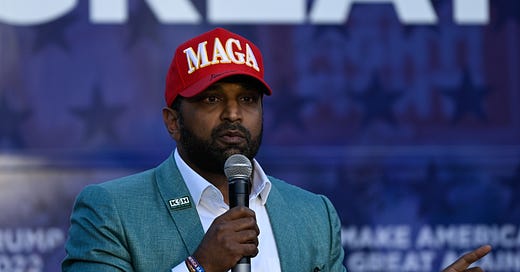Kash Patel Is Unsuited to Be FBI Director
And he certainly doesn’t pass my own tests from when I was considered for the job.
KASH PATEL FLUNKS BOTH OF THE TESTS that I set for myself when I was being considered for FBI director years ago.
If Trump plunges ahead with his threat to sack the incumbent FBI director, Christopher Wray, whose term still has three years left, and to nominate Patel in his place, the Senate should apply these tests to sink Patel.
Congress decided in 1968 that, once the bureau’s legendary founding director, J. Edgar Hoover, left, any new director would be subject to Senate confirmation and would serve for a ten-year term. The goal was to establish a nonpartisan, professionalized, but finite role not subject to fluctuating political loyalty.
In the aftermath of the abuses by Hoover, and the mendacity of Hoover’s successor (L. Patrick Gray) during the Watergate investigations, this term has proven short enough to prevent the accumulation of power that comes with decades in office, as Hoover enjoyed wielding, but long enough to span more than two presidential terms and thus to insulate the director from temporary political allegiance.
Since that reform, every president has treated the director’s position as largely exempt from the customary turnover of senior executive officials when an administration changes. Even Trump himself, upon assuming the presidency in his first term, did not fire the sitting director. Indeed, in the entire history of the FBI, and even including the history of its predecessor agency going back to 1908, there have been only two instances when a director has been sacked: in 1993, when Bill Clinton fired William Sessions, and in 2017, when Trump fired James Comey.
Nevertheless, Trump almost certainly has the constitutional power to fire the FBI director for any reason, or for no reason. The current Supreme Court is even more insistent than earlier Courts that the president has virtually unbridled discretion to remove all officers of the executive branch, including those officials who were appointed with Senate confirmation. Despite his nominal ten-year tenure, the FBI chief is, technically, just another executive officer within the Department of Justice reporting to the attorney general and ultimately to the president.
Wray has done nothing that justifies premature removal from his statutory term, unlike Sessions, who was fired for perceived misconduct. That is not likely to save Wray—or the bureau.
But Kash Patel as his replacement? Not according to the tests that I applied to myself.
IN 1977, THE POSITION OF FBI DIRECTOR came open when Clarence M. Kelley decided to leave prematurely. The bureau was still reeling from the disclosures about Hoover’s lawless escapades and his successor’s clandestine cooperation with the White House in trying to undermine the Watergate investigations into President Richard Nixon’s own abuses of power.
President Jimmy Carter concluded that the most savory and transparent way to fill this sensitive post was to create a special, independent commission to scour the country for qualified candidates. The eight-member commission was chaired by DuPont chairman Irving S. Shapiro. As the New York Times editorialized, the “question” was whether anyone “offers enough stature for the F.B.I. directorship, one of the most difficult public policy jobs in the nation.”
The commission cast a very wide net, and it swept me in. As I later learned, the president of Columbia University had suggested that, based on my experiences as deputy solicitor general of the United States for criminal and national security matters and as counsel for the Watergate special prosecutor, I might be a suitable candidate.
In due course, I was invited to meet with the members of the commission for an interview, where I was told that I was under serious consideration for the small slate that the commission was to recommend to the president and the attorney general. In order to avoid leaks about the identity of the semifinalists, the commission arranged for a Justice Department official to pick me up in a government sedan and drive into the basement of a hotel in the Foggy Bottom neighborhood of Washington where the commission was conducting the final round of screening.
It was at that point that I articulated the twin tests that Kash Patel cannot satisfy.
The first came in response to a question inviting me to identify what qualifications I thought the commission should be seeking in the next director of the FBI. Over my years in the Justice Department, when my first office was right down the hall from Hoover’s, and then during Watergate and thereafter, I had thought a lot about that issue.
I responded crisply: “A good sense of humor.”
The members of the commission were visibly stunned at an apparently flippant comment. But I explained that I was certain that all of the candidates whom they were seriously considering already had to be persons of experience, integrity, and intelligence. But, I added, I had observed the enormous amount of power that the director wields. For this reason, it seemed to me that the commission should filter out anyone who lacks the capacity to recognize his own fallibility and is not able to laugh at himself.
The extensive record that Kash Patel has created shows exactly the opposite, someone who is arrogantly self-righteous and angry, precisely the qualities that I urged the Shapiro commission to reject.
After further conversation with the various commissioners, I informed them that I had decided to withdraw from any further consideration. This is where I formulated my second test. As I explained without any false modesty, “If the commission cannot find any candidates better qualified than I am to run the FBI, the country must be in a hell of a shape.”
As it turned out, I may have spoken prophetically. Carter rejected all of the five men (yes, all men) on the commission’s slate. Instead, Carter turned (briefly) to federal judge Frank M. Johnson Jr. and then, when Johnson became ill, to another federal judge, William H. Webster, who served with distinction for years.
By no stretch of a fevered imagination could Kash Patel or any of Trump’s most earnest supporters claim that there is no one better qualified by experience, judgment, and temperament than Patel to serve as the nation’s chief federal law enforcement officer.
Even though the country is in “a hell of a shape,” there has to be someone better qualified than he is. But I doubt that he recognizes it: this inexperienced ideologue and Trump acolyte can’t see himself for what he is. That is exactly the problem that I tried to highlight more than forty years ago.






